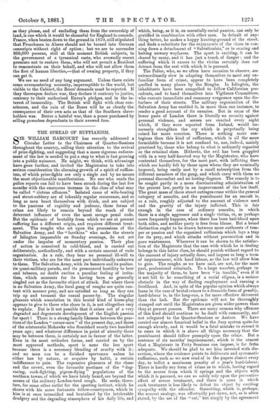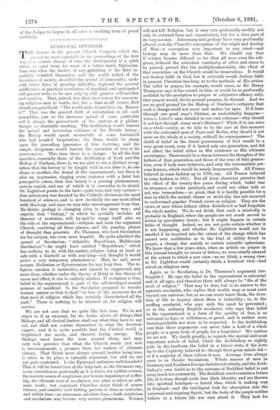THE SPREAD OF RUFFIANISM.
SIR WILLIAM HARCOURT has recently addressed a Circular Letter to the Chairmen of Quarter-Sessions throughout the country, calling their attention to the revival of prize-fighting, and suggesting that a more rigorous enforce- ment of the law is needed to put a stop to what is fast growing into a public nuisance. He might, we think, with advantage have gone further, and invited the Magistrates to take into serious consideration the alarming growth of a spirit of ruffian- ism, of which prize-fights are only a single and by no means the most objectionable manifestation. No one who reads the police reports can fail to have been struck during the last few months with the enormous increase in the class of what may be called "riotous offences." Isolated cases of wife-beating and street-robbery are of tolerably regular recurrence, and so long as men besot themselves with drink, and are subject to the passions of cupidity and jealousy, these forms of crime are likely to remain beyond the reach of the deterrent influence of even the most savage penal code. But the epidemic of brutality from which we are at present suffering has a different origin, and requires different treat- ment. The roughs who set upon the processions of the Salvation Army, and the " larrikins" who make the streets of Islington impassable on Sunday evenings, do not act under the impulse of momentary passion. Their plan of action is conceived in cold-blood, and is carried out deliberately, methodically, and with a certain amount of rude organisation. As a rule, they bear no personal ill-will to their victims, who are for the most part individually unknown to them. The Salvation Army, with its banners and its psalms, its quasi-military parade, and its pronounced hostility to beer and tobacco, no doubt excites a peculiar feeling of irrita- tion, which accounts for its having been so generally singled out as the favourite object of attack. But where there is no Salvation Army, the local gang of roughs are quite con- tent with meaner prey, and are satisfied so long as they can trip up and torment the casual passer-by. The singular pleasure which association in this brutal kind of horse-play appears to give to those who share in it, is not altogether easy to explain. But is it not possible that it arises out of a very degraded and degenerate development of the English passion for sport ? There is a strong family likeness between the prac- tices of the London " corner-men" of the present day, and those of the aristocratic Mohawks who flourished nearly two hundred years ago ; and whatever difference in point of atrocity there may be between them, is certainly not in favour of the latter. Even in its most orthodox forms, and carried on by the most approved methods, sport is none the less sport because there is a necessary blending of cruelty with it : and no man can be a finished sportsman unless he either has by nature, or acquires by habit, a certain indifference to pain. The expensive pleasures of the chase and the covert, even the favourite pastimes of the "dog- racing, cock-fighting, pigeon-flying" populations of the northern towns, of which we have lately heard, are beyond the means of the ordinary London-bred rough. He seeks, there- fore, for some other outlet for the sporting instinct, which he shares with his more fortunate fellow-countrymen, which in him is at once intensified and brutalised by the intolerable drudgery and the degrading atmosphere of his daily life, and
which, being, as it is, an essentially social passion, can only be gratified in combination with other men. In default of any- thing better, he makes a happy hunting-ground of the street. and finds a substitute for the enjoyments of the chase in run- ning down a detachment of "Salvationists," or in snaring and baiting unwary wayfarers. The sport is exciting, it can be shared by many, and it has just a touch of danger ; and the suffering which it causes to the victim certainly does not detract from the zest with which it is pursued.
The Police, who, as we often have occasion to observe, are extraordinarily slow in adapting themselves to meet any un- familiar form of crime, appear to have been completely. quelled in many places by the Roughs. In Islington, the inhabitants have been compelled to follow Californian pre- cedents, and to band themselves into Vigilance Committees, who execute immediate and summary vengeance upon the dis- turbers of their streets. The military organisation of the Salvation Army has enabled it, in more than one instance, to render a good account of its enemies. But in some of the lower parts of London there is literally no security against personal violence, and scenes are enacted every night which, if they were reported from Ireland, would im- mensely strengthen the cry which is pirpetually being raised for more coercion. There is nothing more con- tagious than this kind of ruffianism, which is all the more formidable because it is not confined to, nor, indeed, mainly practised by, those who belong to what is ordinarily regarded as the criminal class. Hitherto, the evil has been grappled with in a very half-hearted way by the Magistrates, who have contented themselves, for the most part, with inflicting fines which are hardly felt by those upon whom they are nominally imposed, being easily met by a small subscription from the different members of the gang, and which carry with them no personal discomfort and no lasting disgrace. The remedy is to be sought partly in a more discriminating administration of the present law, partly in an improvement of the law itself. The great mass of these street outrages come within the general category of assaults, and the punishment for an assault is, as a rule, roughly adjusted to the amount of violence used and the gravity of the injury inflicted. This is fair enough in the case of ordinary assaults, in which there is a single aggressor and a single victim, or, as perhaps more frequently happens, when there has been bad-blood upon both sides, and neither party is free from blame. But a broad distinction ought to be drawn between mere outbursts of tem- per or passion and the organised ruffianism which lays a trap for its prey, and which attacks without provocation and in pure wantonness. Wherever it can be shown to the satisfac- tion of the Magistrate that the case with which he is dealing belongs to this latter class, he should punish without regard to the amount of injury actually done, and impose as long a term of imprisonment, with hard labour, as the law will allow him to give. The roughs, as we have said, are not, for the most part, professional criminals. To a large number, perhaps to the majority of them, to have been "in trouble," even if it is not felt to be something of a social stigma, is a serious obstacle in the way of finding employment arid earning a livelihood. And, in spite of the popular opinion which always leans in the case of brutal crimes to a dramatic form of penalty, hard-labour is, in the long-run, a far more effective deterrent than the lash. But the epidemic will not be thoroughly stamped out until the Magistrates are given wider powers than they at present possess. There are many reasons why offences of this kind should continue to be dealt with summarily, and not relegated to the Quarter-Sessions or Assizes. We have carried our almost fanatical belief in the Jury system quite far enough already, and it would be a fatal mistake to extend it to cases in which it is above all things necessary that the- punishment should follow promptly upon the crime. But a. sentence of six months' imprisonment, which is the utmost that a Magistrate in Petty Sessions can impose, is far frdm adequate. We should be glad to see him invested with dis- cretion, where the evidence points to deliberate and systematic ruffianism, such as we now read of in the papers almost every day, to inflict a maximum penalty of a year's hard-labour.- There is hardly any form of crime as to which, having regard' to the source from which it springs and the objects with which it is pursued, we can so safely rely upon the preventive effect of severe treatment, and there is none in which such treatment is less likely to defeat its object by exciting sympathy with the offender. Garrotting, which is, perhaps, the nearest analogy, was effectually put down, not, as is often stated, by the use of the "cat," but simply by the agreement
of the Judges to impose in all cases a crushing term of penal servitude.































 Previous page
Previous page